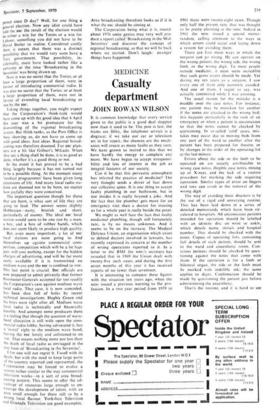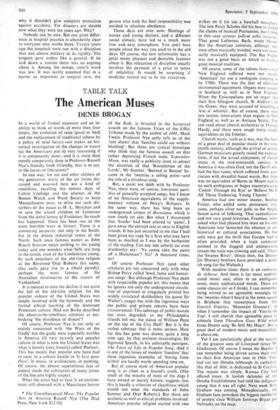MEDICINE
Casualty department
JOHN ROWAN WILSON
It is common knowledge that every service given to the public is a good deal sloppier now than it used to be. The post is late, the trains are filthy, the telephone service is a disgrace; if we take our car or television set in for repair, the chances are the mech- anics will create as many faults as they cure. We have grown so inured to this that we have hardly the energy to complain any more. We have begun to accept irresponsi- bility and loss of interest in the job as integral features of our society.
Can it be that this pervasive atmosphere has infected the practice of medicine? The very thought sends a shiver of fear down our collective spine. It is one thing to accept faulty plumbing in our bathroom, but in our insides it is really beyond a joke. And the fact that the plumber gets more for an emergency visit than a doctor for treating us for a whole year is really beside the point.
We might as well face the fact that faulty medicinal plumbing, though still fortunately rare, is by no means unknown. And it seems to be on the increase. The Medical Defence Union, an organisation which exists to defend doctors involved in lawsuits, has recently expressed its concern at the number of wrong operations reported to it. In a letter to the BM! the mou's secretary has revealed that in 1969 the Union dealt with twenty-five such cases, and during the first seven months of this year it has received reports of no fewer than seventeen.
It is interesting to compare these figures with the situation ten years ago, when the MDU issued a previous warning to the pro- fession. In a two year period from 1959 to
1961 there were twenty-eight cases. Though only half the present rate, that was thought to be pretty alarming at the time. Indeed in 1961 the meal issued a special memo- randum, calling attention to the ways in which errors could occur and laying down a system for avoiding them.
There are four main ways in which the surgeon can go wrong. He can operate on the wrong patient, the wrong side, the wrong limb, or the wrong digit. To most people outside medicine, it must seem incredible that such gross errors should be made. Yet during my ten years as a surgeon. I saw every one of them only narrowly avoided. And one of them, I regret to say, was actually committed while I was assisting.
The usual reason for the mistake is a muddle over the case notes:For instance, one patient may be mistaken for another if the notes are attached to the wrong bed; this happens particularly in the rush of an emergency or when a patient is unconscious so that the notes cannot be checked by questioning. In so-called 'cold' cases, mis- takes may occur due to moving beds from one part of the ward to another after the patient has been prepared for theatre, or by changes in the order of the operating list at the last minute.
Errors about the side or the limb to be operated on are usually attributable to wrong case notes, illegible case notes, mixing up of X-rays, and the lack of a routine procedure for marking the side requiring operation. Similar types of error on fingers and toes can result in the removal of the wrong digit.
The way of avoiding these disasters is by the use of a rigid and unvarying routine. This has been laid down in a series of detailed memoranda which have been cir- culated to hospitals. AU unconscious patients intended for operation should be labelled with an identity disc on wrist or ankle. which details name, initials and hospital number. This should be checked with the notes. Copies of operating lists, containing full details of each patient, should be sent to the ward and anaesthetic room. Con- scious patients should be checked by ques- tioning against the notes that come with them. If the operation is for a limb or bilateral organ, the side or the limb must be marked with indelible ink; the same applies to digits. Confirmation should be made by questioning the patient just before administering the anaesthetic.
That's the routine, and it is hard to see
why it shouldn't give complete protection against accidents. Yet disasters are double now what they were ten years ago. Why?
Nobody can be sure. But one great differ- ence in hospital practice is abundantly clear to everyone who works there. Twenty years ago the hospitals were run with a discipline that was almost military in its rigidity. The surgeon gave orders like a general. If he laid down a routine there was no arguing about it. Among the nurses, sister's word was law. It was tacitly assumed that in a matter as important as surgical care, the person who took the final responsibility was entitled to absolute obedience.
Those days are over now Shortage of nurses and young doctors, and a different social climate, have led to a much more free and easy atmosphere. You can't boss people about the way you used to in the old days. Of course, the new informality has a great many pleasant and desirable features about it. But relaxation of discipline usually involves the payment of a price in terms of reliability. It would be surprising if medicine turned out to be the exceptions































 Previous page
Previous page